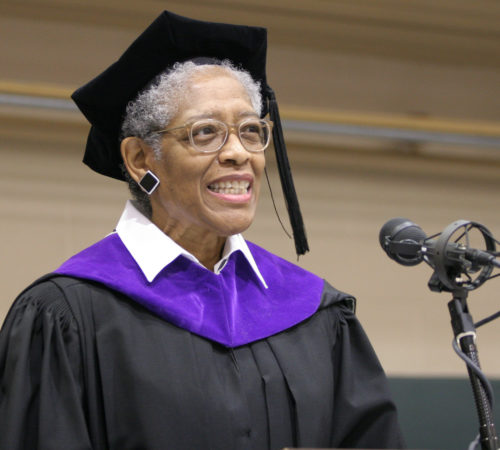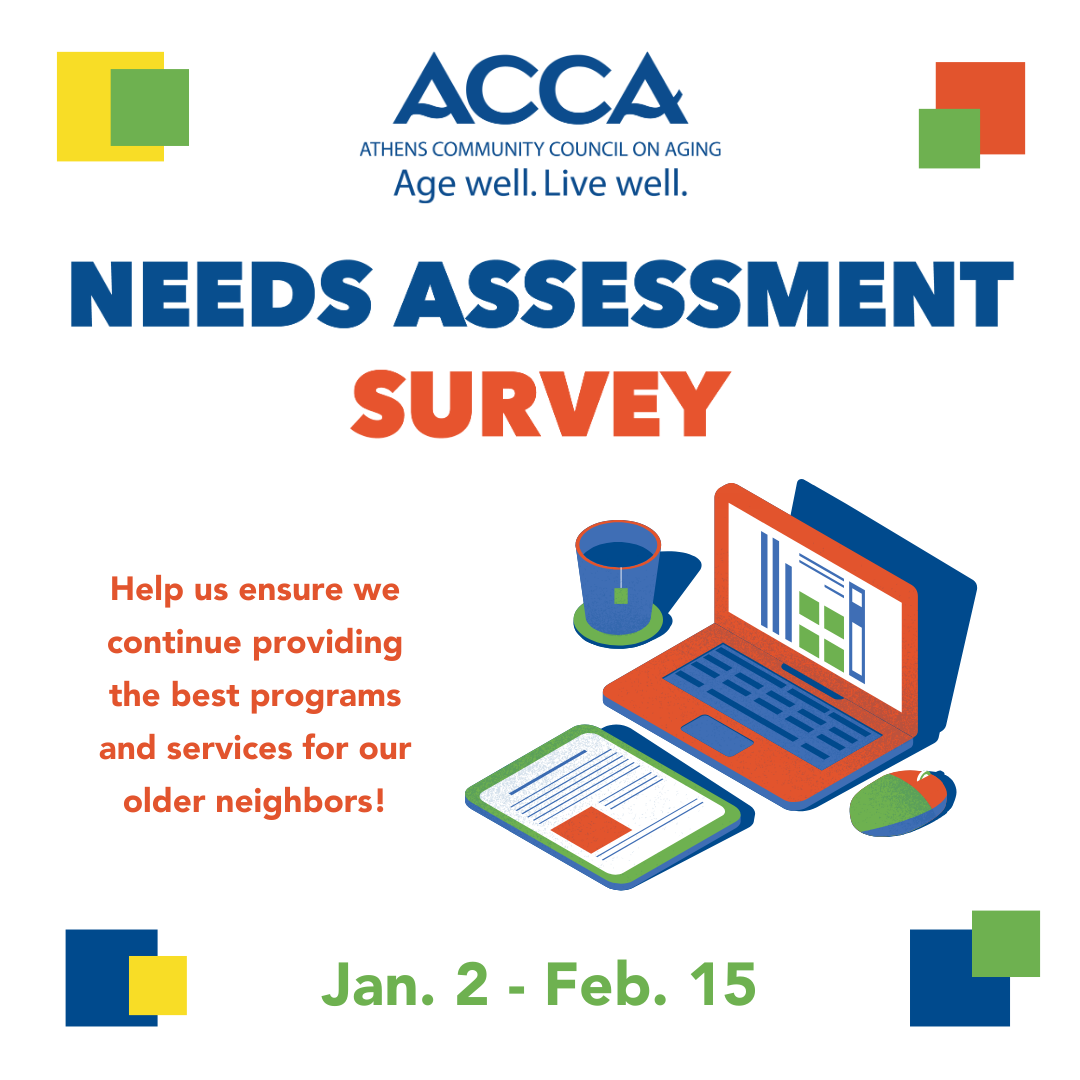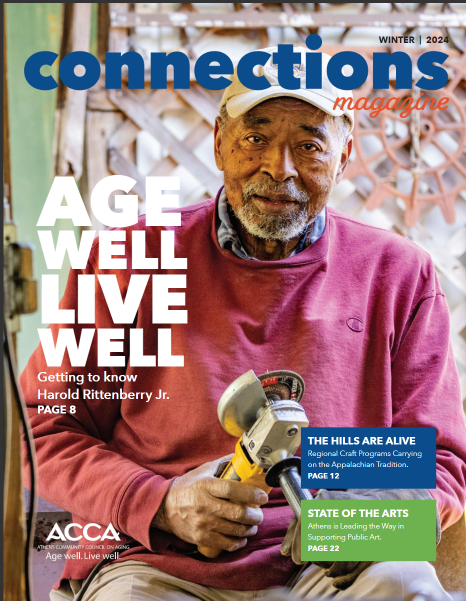Judge Patricia Barron

A native of Atlanta, Judge Patricia Barron has called Athens her home for over 20 years. She received a law degree from Georgetown University Law Center in Washington, D.C., in 1979 and a bachelor’s degree in political science from Mercer University in Macon in 1976. In February 2001, Judge Barron was sworn in as Associate Magistrate Court Judge in Athens-Clarke County. In August 2002, she was appointed to the position of Chief Magistrate Court Judge. Judge Barron was elected to her first four-year term as Chief Magistrate Judge in 2004 and successive terms in 2008 and 2012.
Tell us a little about yourself, your background and how you got interested in the law.
I was born and raised in Atlanta and went to public schools there. I was taking a seventh-grade Social Studies class and we were studying the history of slavery. It was right around the time of the Civil Rights era. We talked about how certain people’s right weren’t protected because they didn’t have a voice and how important it was for those of us who were educated to speak up for others. I’d never met a lawyer until my first year of college, but I thought that’s something I want to do, to have a voice for the people who weren’t able to do that.
I think the magistrate court was meant for me because I get to explain to people, who are not represented by lawyers, what the law says and how the law impacts their lives.
How did you end up in Athens?
I was working for Georgia Legal Services in Douglas County and, unfortunately, our managing attorney here in Athens was involved in a car accident and while he was recuperating, I volunteered to come here to help the new attorneys. That was 1988. He passed away in 1989 and I took his job as managing attorney for Georgia Legal Services and fell in love with Athens. I’m still here. It’s a wonderful community. I like the diversity, a mixture of ages, races and gender. Everyone really cares about the community and the concerns here. There’s so much to do here in terms of entertainment, sports and cultural activities.
How has Athens as a town grown and changed over the years?
There are more people than when I first moved here. From a legal standpoint, there are more problems. From the criminal side, crime sort of has its ups and downs so we see cases a lot. There’s a lot more youths committing crimes than when I first became judge in 2001, but there are also a lot more youth programs designed to prevent crime. On the criminal side, I have seen a lot more advocacy done on the prevention side than the incarceration side. So that’s very good. From the civil side, as the economy goes up and down, more people are being sued. Civil cases go up and down. As the population grows, the problems grow and we see cases increase as the economy gets more difficult.
From the social side, I see Athens as always evolving into a community of a variety of cultures so there are more types of entertainment than there were before. There is more diversity at the university regarding the people and the courses they offer to students. I think the growth of the community has been a good thing in terms of population, entertainment and culture.
What challenges or obstacles have you faced?
The story I like telling the best is when I first became a lawyer. I worked in south Georgia in a town called Americus. I graduated law school in 1979 and was the only African American attorney in town. The Bar Association met at the country club. They didn’t allow African Americans at the country club in this town so rather than moving the Bar Association meetings, they just canceled them. So, for five years there were no Bar Association meetings in Americus, Georgia because African Americans weren’t allowed at the country club. The good news is that when I left in September 1984, they decided to have the Bar Christmas party at the country club. So, everybody in my old office called and said, “you have got to come to the Christmas party!” I wanted to take an African American man as a date and tried to find the most radical one. I took him to the party, and we were very well received. I tell that story because from 1984, when I wasn’t allowed to go to the country club or the bar meeting, fast forward to Athens, Georgia, where I became Bar president. So, to go from not being allowed to attend meetings, to becoming the president, that tells you a lot about how the times have changed and the community of Athens. At my very first Bar meeting in Athens, I remember Judge Stevens and Judge Steve Jones warmly welcoming me. To eventually become Bar president in the 90s, was the icing on the cake for me.
I’ve had obstacles. There have been clients over the years that didn’t feel comfortable with African American attorneys. Because I worked for Georgia Legal Services, and it was a free service that didn’t allow you to pick your lawyers, the deal was either I’m your lawyer or you don’t have one at all. One of my very first cases as a judge, I had a plaintiff that protested me being the judge of the case. He spoke with three lawyers who said he would be foolish not to let me hear the case because I knew more about landlord-tenant law than any other judge in this town. After that he said I could hear his case.
What’s your favorite part about being a judge in Athens?
The thing I love most about Athens is if you work hard and you really want to do a good job, people recognize that and will give you the opportunity to do so. I think the struggles I’ve had over the years have molded me and made me stronger and better person, but also think people see the genuineness in me and my willingness to listen to both sides to make a fair decision, not based on who you are or where you come from, but based on the law and the facts. I’m very proud to say I can serve the community in that way.
What’s the one part of your job that gets you excited for the day?
I like making decisions. I really do. I like making difficult decisions. … Most of ours don’t have lawyers and they are making a good case for themselves, so I’m listening to them. They don’t know the law often. They just say whatever comes to mind to try to give me the facts. I ask as many questions as I can to get the facts. I’ll have two people in front of me, both are completely right in what they are saying. I know what the law says and who can prevail based on the law. I like to deliver my decisions in a way that they can understand. After they deliver all the evidence, then I sit and think before I come back. First, I’ll tell them the reason I’ve decided the way I’m deciding. That way, I can tell each the good points they had in their argument and I’ll say what was good about both sides. Then I’ll say I’m ruling because this is what the law says, and this is why I made my decision. I like making decisions in difficult situations, but I also like explaining the reasons behind the decisions.
What’s an interesting case you’ve seen?
The most surprising case was a civil case where the previously engaged couple were fighting over the wedding ring. The gut in me said she should be able to keep the wedding ring, but I had no idea what the law said because I had never seen a case like this before. I heard from the man and the woman. I did the research and it’s based on case law. The law says that whoever broke the engagement, the other one gets the ring or the value of the ring. It was interesting because they both claimed the other ended the engagement. He texted an old girlfriend in the middle of the night and accidentally sent it to his fiancé instead. So, when she got it, she knew it wasn’t for her and she went off. So, he said she broke off the engagement because she didn’t want to marry him after that. She said he broke it off as soon as he sent that text. So that was a toss-up. It was a struggle and I can’t remember exactly how I ruled on that. Your readers will have to guess or call me or email me to find out!








